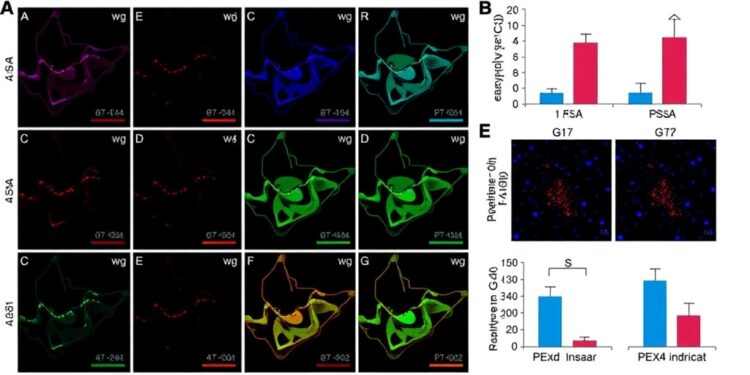Colorectal cancer (CRC) represents one of the most pervasive health issues encountered globally, with a significant mortality rate despite advances in treatment modalities, particularly radiotherapy. One of the complex challenges facing oncologists in treating CRC is the phenomenon of radioresistance, an innate ability of cancer cells to withstand the harmful effects of radiation therapy. A recent study has made strides in elucidating the underlying mechanisms of radioresistance in CRC by focusing on two pivotal elements: miR-4274 and peroxisomal biogenesis factor 5 (PEX5). This research unveils a potentially transformative therapeutic pivot that could enhance the efficacy of radiotherapeutic regimes for CRC patients.
The study’s investigators shine a spotlight on a specific single-nucleotide polymorphism (SNP), referred to as rs1553867776, located in the seed region of miR-4274. This SNP has been linked with altered radiosensitivity in CRC patients, suggesting that genetic variations could influence individual responses to radiotherapy. The critical discovery here is that the deletion genotype of this SNP correlates with a marked decrease in PEX5 protein expression, which has significant implications for tumor sensitivity to radiation treatment.
PEX5 has long been recognized as an essential protein that plays a role in peroxisomal function and biogenesis. In this study, researchers have confirmed PEX5 as a direct target of miR-4274 and have demonstrated that silencing or downregulating PEX5 expression enhances tumor resilience against radiation. This presents an intriguing puzzle in which the diminishing levels of PEX5 may lead to a heightened ability of CRC cells to repair radiation-induced DNA damage, thus promoting survival and recurrence post-treatment.
The significance of the interaction between PEX5 and Ku70 cannot be overstated; it unveils a crucial map of how cellular mechanisms dictate the response to therapeutic interventions. When PEX5 is present in elevated amounts, it may hinder Ku70’s nuclear translocation, effectively blocking its role in the DNA damage repair process. This blockage allows for greater accumulation of DNA damage in CRC cells, rendering them more susceptible to radiation therapy.
In an effort to solidify the link between PEX5 and ferroptosis, an iron-dependent cell death pathway known to influence cancer cell survival, researchers discovered that manipulating PEX5 levels could amplify or mitigate ferroptosis in CRC. This revelation hints at a more complex network of cellular signaling that may affect not only cell survival in response to treatment but also overall tumor behavior in a clinical setting.
To explore the in vivo relevance of their findings, the study also involved a series of animal experiments that tested the effects of miR-4274 and PEX5 on tumor growth and radiosensitivity in mouse models of CRC. The results were striking: tumors expressing the deletion-type of miR-4274 exhibited robust growth, while those with PEX5 knockout resulted in enhanced tumor development. This underscores the role of these molecular players in not only influencing patient response to radiotherapy but also in affecting the overall trajectory of cancer progression.
The wider implications of this research are significant. By identifying the miR-4274-PEX5 axis as a central player in CRC radioresistance, the authors open a pathway for developing targeted therapeutic strategies that could improve treatment outcomes for patients. As oncologists and researchers strive to personalize cancer treatment, understanding these underlying genetic and molecular factors becomes paramount.
The study advocates for a shift towards utilizing genetic profiling to inform therapeutic decisions. With the capable bioinformatics tools currently available, it becomes feasible to consider patients’ specific SNPs and miRNA profiles when formulating treatment plans. Such an approach not only has the potential to enhance the efficacy of radiotherapy for CRC patients but could also mitigate side effects by tailoring interventions more closely to individual biological responses.
In conclusion, this research not only deepens the understanding of CRC radioresistance mechanisms but also emphasizes the need for novel therapeutic targets like PEX5 and miR-4274. As the field continues to evolve, it is clear that integrating molecular insights with clinical practice will be essential in overcoming the challenges posed by radioresistance and improving survival rates for colorectal cancer patients. The journey from bench to bedside is arduous, but insights derived from such studies pave the way for innovative treatment modalities in the fight against cancer.
With increasing detection rates of genetic variations influencing treatment outcomes, future strategies must embrace this genetic framework. As clinical approaches evolve in response to new knowledge, the hope remains that personalized medicine will indeed become the cornerstone in managing CRC and ultimately improving patient outcomes.
Subject of Research: Not applicable
Article Title: Polymorphism in the Hsa-miR-4274 seed region influences the expression of PEX5 and enhances radiotherapy resistance in colorectal cancer
News Publication Date: 29-Aug-2024
Web References: Link to the Article
References: None available
Image Credits: Qixuan Lu, Ningxin Ren, Hongxia Chen, Shaosen Zhang, Ruoqing Yan, Mengjie Li, Linlin Zheng, Wen Tan, Dongxin Lin
Keywords: Colorectal cancer, radioresistance, miR-4274, PEX5, single-nucleotide polymorphism, DNA repair, personalized medicine





